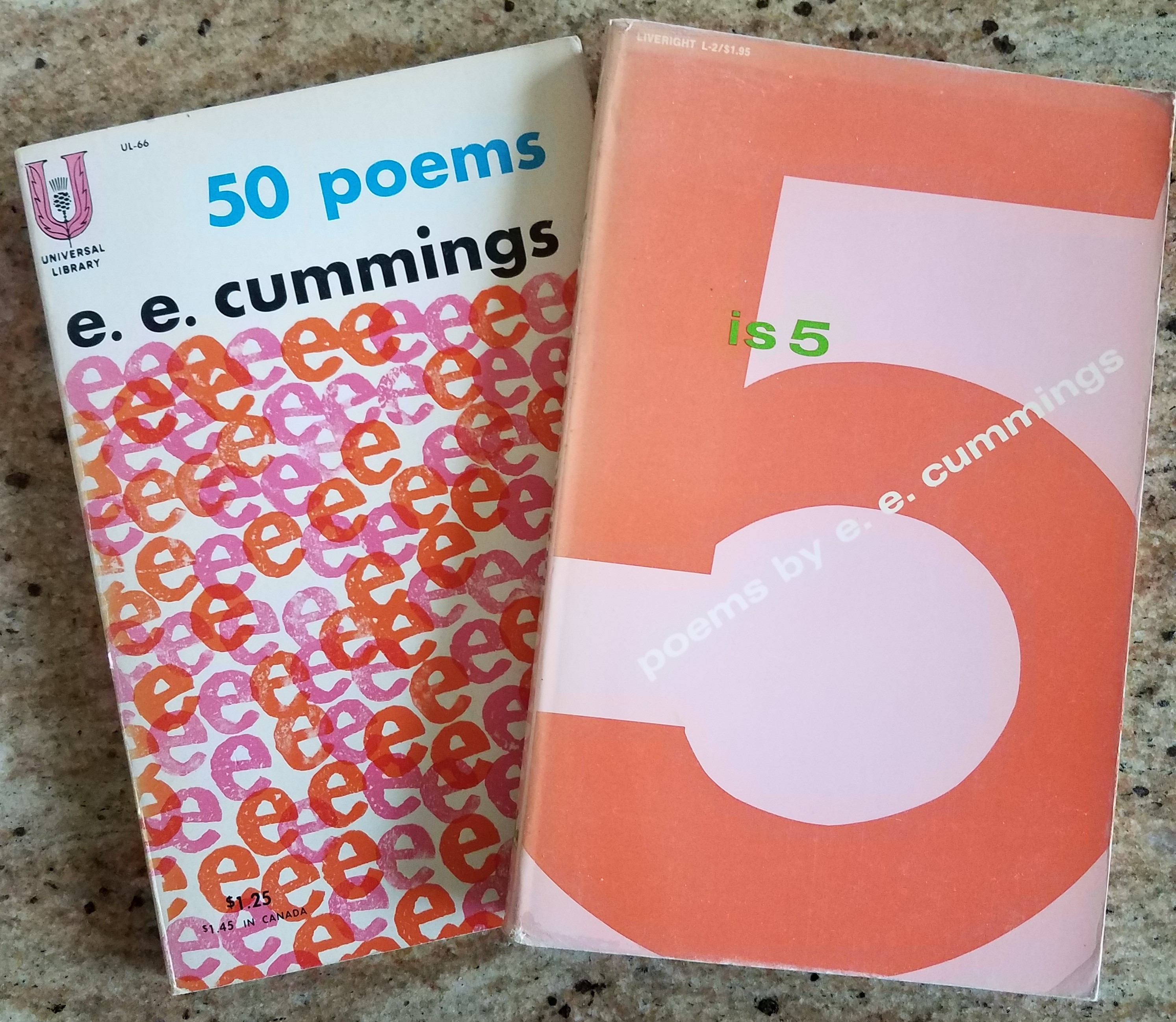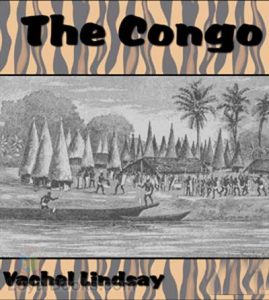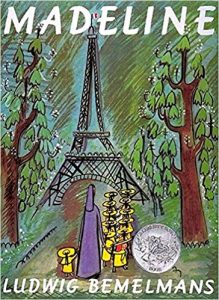
There are many poets whose work I cherish. For instance, Robert Frost. I can easily recite all four stanzas of “Stopping By Woods on a Snowy Evening” and most of “The Road Not Taken,” although I don’t recall ever intentionally trying to memorize them. I love anything by e. e. cummings. I don’t know any of his poems by heart. They don’t rhyme, which makes them harder to memorize. And his unorthodox spacing of words and lines makes his poems better to read than to hear anyway. My college boyfriend gave me two books of his poetry for our first anniversary, which I still take off the shelf and read from time to time. I also like to read women poets (or poets who happen to be women), like Emily Dickinson, Sylvia Plath, and Maya Angelou, to name a few.
However, when I first thought about this prompt, there was only one poem that immediately leapt into my mind. In eighth grade, for one marking period, instead of our English class we had Speech. I don’t remember too much about the class, other than the fact that we all had to memorize the following poem. We didn’t need to understand what it was about, we just had to practice reciting it with dramatic intonation.
Fat black bucks in a wine-barrel room
Barrel-house kings with feet unstable
Sagged and reeled and pounded on the table.
Pounded on the table
Beat an empty barrel with the handle of a broom
Hard as they were able- boom, boom, boom
With a silk umbrella and the handle of a broom
Boom lay boom lay boom lay boom.
 I never knew until I googled it for this story that it is just the opening stanza of a much, much longer poem called “The Congo” by Vachel Lindsay. The poem is subtitled “A Study of the Negro Race.” He first performed it in public to great acclaim in 1914. Later it became controversial. Certainly in the current times I cannot imagine any teacher assigning it to a high school or middle school class. But in my 1964 eighth grade class nobody batted an eyelash. Of course, that may be because we never discussed the meaning of the poem. I didn’t realize until now that the “fat black bucks” he speaks of are actually people. What we were focused on was the cadence of our voices as we recited it. The booms had to be loud, of course. On the line about the silk umbrella and the handle of a broom, we raised our hands and our voices up and then back down again in an arc.
I never knew until I googled it for this story that it is just the opening stanza of a much, much longer poem called “The Congo” by Vachel Lindsay. The poem is subtitled “A Study of the Negro Race.” He first performed it in public to great acclaim in 1914. Later it became controversial. Certainly in the current times I cannot imagine any teacher assigning it to a high school or middle school class. But in my 1964 eighth grade class nobody batted an eyelash. Of course, that may be because we never discussed the meaning of the poem. I didn’t realize until now that the “fat black bucks” he speaks of are actually people. What we were focused on was the cadence of our voices as we recited it. The booms had to be loud, of course. On the line about the silk umbrella and the handle of a broom, we raised our hands and our voices up and then back down again in an arc.
There were 31 students in my 8th grade class, 29 who are still living, and I have email addresses for all of them. While contemplating this prompt, I sent an email to everyone asking if they remembered the poem, in which year and which class we memorized it, and who was the teacher. I got numerous answers, with some disagreement about the year and the teacher, but EVERYBODY remembered the poem. And that was fifty-five years ago! We may not be able to remember where we left our car keys or who we had dinner with last week, but we have never forgotten this poem!
According to one source I read, Vachel Lindsay was the most popular poet in America in the 1920s. He was friends with W.B. Yeats, and Yeats looked up to him! His poems were in all the anthologies in the ’40s, ’50s, and ’60s. However, by the ’70s his poetry had fallen out of favor, and in the ’80s he was removed from the Norton Anthology. He never knew about any of this, because he committed suicide in 1931 by drinking a bottle of Lysol. His last words were: “They tried to get me; I got them first!”
On a very different note, once I had children, I discovered the poetry of many children’s books. A favorite of all my children when they were young was Madeline, which is written entirely in verse. We read it so many times that they easily memorized it. I have a vivid image of Molly, my youngest, at age three at the library with a big hardcover edition of Madeline on her lap. Even though we had our own copy at home, when she saw it at the library, she wanted to “read” it there too. She was reciting it as she turned the pages.
In an old house in Paris 
That was covered with vines
Lived 12 little girls
In two straight lines . . .
The smallest one was Madeline.
A six-year-old girl we knew was at the library that day, saw Molly and was astonished that she could read so well at such a young age. She made a comment to me. I was tempted not to, but I admitted that Molly was not really reading it, she knew it by heart, which made the other girl feel much better.
Song lyrics are yet another form of poetry, and my brain is filled with a million songs that I have learned, starting when I was a small child, and have never forgotten. I can easily memorize songs even if they are in a language I don’t know. I learned the Marseillaise at age ten or so, entirely phonetically, and can still sing it even though I have only a slight knowledge of French. I can also sing the Ode to Joy from Beethoven’s Ninth at the drop of a hat despite not speaking a word of German. In fact, I used to sing it so much to my daughter Sabrina when she was little that she knows all the words too, and she doesn’t speak German either.
If I had gone to college at a different time, I definitely would have been an English major. But in the late sixties-early seventies, politics and revolution were all I could think about, so I majored in Government. Now, in my retirement, I am catching up on the novels — and poems — I didn’t read then.



What a wistful recall of the paths and arteries that poetry has taken in your life. The covers of the e. e. cummings paperbacks, Madeline! my gawd, how evocative. I was caught up by the anachronism of Vachel Lindsey’s poetry, and your analysis. So much of what we’ve read in the past has become beyond passé to incongruous.
And with others who posted here, poetry has taken a back seat to more ‘pressing’ writing and other agendas but, like theater and music, poetry rocks! Thanks, Suzy.
Thanks for your comment. Poetry does rock! And Bob Dylan won the Nobel Prize for Literature, so I think we are justified in looking at song lyrics as poetry too. You know a thing or two about those!
Suzy, I feel such a kinship to what you have shared. Of course, memorizing that portion of The Congo without understanding what it was about is sadly typical of educational practices, both then and sadly now. My kids, especially my daughters, loved Madeline. We wore out many copies of it and I can still recite it by heart. I really enjoyed reading your associations to poetry.
Thank you, Laurie. I didn’t manage the sweeping review of poetry that you gave us in your story, but it was fun to share some thoughts about the poems of my life. This turned out to be a great prompt!
Thank you, Suzy! I never consider myself a big fan of poetry — other than ingenious light stuff by Ogden Nash or Dorothy Parker or any limerick with the word “Nantucket” in it — and yet you reminded me of perhaps my two favorite poems. We also read “The Congo” in junior high and I remember thinking how wise our English teacher was for introducing it to us. It was just so much damn fun to read out loud! And, of course, Madeline, from my own childhood and then my daughters’. (Sigh….)
That said, your true love of poetry shines through your story, including your amazing ability to absorb (not simply memorize) the words, even in foreign languages. And pass that on to your children. And isn’t it great that one can catch up at any point in one’s life?
How great to hear that kids in Connecticut were reading “The Congo” too! Maybe it was a NY metropolitan area thing. Did you read the entire poem or just the first stanza like my class did?
You should totally write a story this week about Ogden Nash, Dorothy Parker, and limericks with the word “Nantucket” in them! I, for one, would be delighted to read that!
We read the whole poem, Suzy. This was Honors English, after all. (-:
Your first example is so interesting, Suzy. I immediately read the “Fat black bucks” and was taken aback. Times certainly have changed; I am not surprised that this poet has fallen out of favor, but I totally understand the cadence of it.
A favorite children’s book of my kids was “Chick-a-chick-a-Boom-Boom”, which was used in a Super Bowl ad with the rapper LudaCris (he’s reading it to his kid, then continues reciting it in the shower and turns it into a rap). We loved the cadence of it, repeating it over and over again, as with so many of the rhyming children’s stories.
I, too, liked many of the standard poets you mentioned, like Robert Frost, Emily Dickinson and others. And so many of the poems have been turned into songs, which makes them even more accessible for me. And yes, song lyrics are yet another form of poetry. I agree with all that you say.
Thanks Betsy. One of my favorite poems that was turned into a song is “The Highwayman” by Alfred Noyes, which was set to music by Phil Ochs. If you don’t know it, you should check it out.
This brought back a memory: we had to memorize Longfellow’s “Evangeline” in 8th grade. I could not tell you why. My husband and I have used lines from e.e. cummings for birth announcements (” this is the birth
day of life and love and wings and of the gay
great happening illimitably earth”) and “(now the ears of my ears awake and now the eyes of my eyes are opened)” so, big fans. I wouldn’t say that poetry is a part of my life right now, but that could certainly change–especially after giving this prompt so much thought this week! Thanks for sharing your memories! (And I am skipping the whole Rod McKuen phase for all our sakes!)
Thanks for your comment, Risa, glad you’re an e.e. cummings fan too. I remember reading Evangeline, probably in 8th grade too, but never learned more than “This is the forest primeval, the murmuring pines and the hemlocks.”
I know the name Rod McKuen, but I don’t think I ever read any of his poems. Now you’ve got me wondering how I missed that phase.
Risa, I, too loved that e.e. cummings poem. I had it hand printed on colored paper and attached to my dorm room wall while in college. I dug it out last weekend (it still lives inside my college day timer), and reread it. I found it just as wonderful as I did almost 5 decades ago when I first stumbled on it. That same day, a younger cousin posted on FB that her young son had just received his first volume of e.e. cummings poetry, so she took him across the street to pay tribute. He is buried in Boston. She posted a photo of his gravestone. This was poignant for me, having just looked at his poem earlier in the day.
Wow, Betsy, I did not know that e.e. cummings was buried in Boston, The next time I am there I will definitely have to go pay him a visit!
Your evocative story reminds us how poetry surrounds us, if only in song lyrics and children’s books, even as our life seems wholly prosaic. The mention of Vachel Lindsay and the striking verse from “The Congo” (which was new to me) flashed me back to high school English and a poetry anthology in which one of his poems appeared. Researching him a bit now, the only one that seems familiar is “The Leaden-Eyed”:
Let not young souls be smothered out before
They do quaint deeds and fully flaunt their pride.
It is the world’s one crime its babes grow dull,
Its poor are ox-like, limp and leaden-eyed.
Not that they starve; but starve so dreamlessly,
Not that they sow, but that they seldom reap,
Not that they serve, but have no gods to serve,
Not that they die, but that they die like sheep.
It turns out it’s also from “The Congo.” I remember being moved by this beautifully crafted poem, but I don’t remember knowing that it was about African-Americans!
This opens up the urgent question of the extent to which we can measure historical figures by today’s standards. According to The Wikipedia, Lindsay was considered an advocate for Negroes and championed their cause. He mentored Langston Hughes! However, what Lindsay celebrated was actually a “primitivist” stereotype that’s easy to see with modern eyes. It’s too bad that such powerful, moving poetry has fallen out of favor because it has lost its historical context. It’s like banning Shakespeare because of his portrayal of Shylock.
I found all of this so engaging, Suzy! My father loved Vachel Lindsay and I never knew about the suicide. (I wonder if Dad knew). He made us (the three oldest kids) memorize a section of “The Congo.” And in fact, these lines are what I recited to him as he lay in his own bed, taking his final breaths, at age 95:
Then I heard the boom of the blood-lust song
And a thigh-bone beating on a tin-pan gong
And “blood” screamed the whistles and the fifes of the warriors,
“Blood” screamed the skull-faced, lean witch-doctors
Whirl ye the deadly voo-doo rattle
Harry the uplands,
Steal all the cattle,
Rattle-rattle, rattle-rattle
Boom
Boom-lay, boom-lay, boom-lay, boom
Mumbo jumbo, God of the Congo
Mumbo jumbo will voodoo you
Mumbo jumbo, God of the Congo
Mumbo jumbo will voodoo you
Dale, thank you, I’m delighted you found my story engaging. And thank you for these lines from The Congo, which I had to recite out loud for full effect. The “Boom-lay boom-lay boom-lay boom” in your passage harkens back to mine. I am so moved to think of you reciting it to your father as he was taking his final breaths.